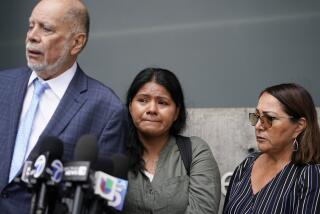More Than Slogans Needed to Prevent Teen Sex
- Share via
Parents are kidding themselves if they think they can persuade teen-agers to postpone sex simply by telling them to “just say no.”
At a time when an estimated 54% of all American high school students reportedly have said “yes,” young people need something stronger than slogans to help them resist the pressure to be sexually active. And, for many, the threat of pregnancy and AIDS isn’t enough, according to Carol Cassell, a nationally recognized sex educator.
Cassell, who is director of the Institute for Sexuality Education and Equity in Albuquerque, N.M., told a group of Planned Parenthood supporters attending a recent luncheon at Le Meridien in Newport Beach that it will take less moralizing and more character building to get teens of the ‘90s to make responsible choices about sex.
The key word is choice, stressed Cassell, addressing about 250 people at the Annual Celebration of Planned Parenthood/Orange and San Bernardino counties.
“Kids have to know it’s their personal right to have sex. It’s their choice--now or later,” she said.
Teen-agers are more likely to conclude that later is better if adults step down from the abstinence soapbox and do a better job of explaining the emotional side of sex, said Cassell, author of “Straight From the Heart: How to Talk to Your Teenager About Love and Sex.”
“There’s an emotional impact to sex that kids aren’t prepared for. For most girls under the age of 17, it’s not a satisfying experience. We need to encourage teens to make the decision to postpone sex until they can handle it,” the former education director of Planned Parenthood Federation of America explained.
But young people who don’t choose to wait shouldn’t be shamed into a state of denial that makes the need for precautions seem remote.
Cassell said some girls are so afraid of being labeled “sleazy” that they’d rather risk getting pregnant than admit they are sexually active and obtain birth control. They end up having what the educator called “zombie sex,” assuaging their guilt afterward by saying, “I didn’t know it was going to happen.”
Such behavior makes “the ‘90s look a lot like the ‘50s in high school,” Cassell said.
She said efforts to help teens become more savvy about sex have been hindered by the “Victorian virus,” which she claimed was behind the opposition to last week’s controversial 4-3 decision by the Los Angeles Board of Education to make condoms available on 49 high school campuses.
“As sophisticated as we are, we are plagued by the idea that sex is evil and uncontrollable--that if contraception is allowed in the hands of young people, they will be promiscuous,” Cassell said.
That point clearly struck a nerve with some of the educators who questioned Cassell during an informal discussion in Santa Ana the morning after her luncheon talk. They complained that they’ve had difficulty getting information on birth control into Orange County public schools because of protests by fundamentalist religious groups advocating abstinence.
One high school teacher at the workshop declined to reveal what she teaches in her “family life classes” because she didn’t want to risk attracting attention to her relatively liberal curriculum. However, she did say, “Students want adult answers, and too many adults don’t want to give them.”
Margie Fites Seigle, executive director of Planned Parenthood in Santa Ana, said a new support group called Education 2000 is building coalitions to foster a “greater comfort level” with the organization’s educational programs, which she admitted have been a “lightning rod” for opposition.
She said she expects Planned Parenthood’s educational programs to increasingly reflect the approach Cassell advocated, moving beyond basic information promoting safe sex to address the reasons even well-informed teens engage in risky behavior.
Cassell contended that sexism is robbing many girls of a compelling motivation to postpone sex--the promise of a future of rich options, including college and career.
According to Cassell, girls of the ‘90s are being raised to think more like women of the ‘50s than feminists. She sees evidence of that in studies showing that girls keep up with boys in math until they reach junior high school, then fall behind for no apparent reason.
Cassell explained it this way: “They step down. They don’t want to compete anymore except for one thing--boys. The only trophy worth winning for seventh- and eighth-grade girls is the most popular boy in school.”
She said girls--particularly those from low-income, minority families--are not preparing for the future because they have bought the Prince Charming fantasy: “Someday, somewhere, he’s going to come along--not on a white horse, but in a white Porsche--and save her from the hard stuff of life.”
Meanwhile, Cassell contended, boys are still being raised with the idea that being a man means “being a good provider,” while it’s become impossible for low-income and even many middle-class families to survive on one income.
Cassell said many teens lose interest in school--40% of today’s teen mothers dropped out of school before they got pregnant-- because they “don’t have a hearty sense that they can make it.”
Today’s most innovative programs to prevent teen-age pregnancy look at “the whole kid” and try to give teens a more positive outlook on the future, she noted.
For example, a pilot pregnancy-prevention program in St. Louis helps teens find jobs and requires them to spend an hour a week in community service. They also attend seminars on a variety of topics related to sex and relationships.
Cassell said programs that give teens a chance to take on physical challenges--rock or mountain climbing, for example--are also effective. Such activities give teens a chance to experience the exhilaration that comes from working through fear and rising to a challenge.
“Kids think that if they’re scared, that’s a reason not to go forward,” Cassell said. “They need to know that scared is a human condition.”
If they can conquer fear on a small scale, then maybe they’ll be able to picture themselves doing the big things that scare them, such as applying for college or a job, Cassell added.
She said sex education programs also need to provide strong role models for girls and recommended that teachers look to history for examples of high-achieving women: “If you never see somebody who walked the path before you, how are you going to have the guts to put your foot on the road?”
Adults can also help by becoming mentors. “Young people need our help on a personal level. They need someone in their life telling them, ‘You can do it, and I’m going to help you.’ ”
It just takes one mentor to make a big difference in the life of a disadvantaged teen-ager, Cassell stressed.
She suggested mentors help teens with homework, take them out to lunch, let them know they can call if they need to talk.
“Teach them things you know about life,” she advised. “Give them one foot in a world they’re not familiar with, a world of stability, a world of non-drugs.”
And don’t worry if you sometimes feel like you’re speaking a different language, Cassell said. “You don’t have to know their music or jive their talk. They need adult input. They want you to be you.”
More to Read
Sign up for Essential California
The most important California stories and recommendations in your inbox every morning.
You may occasionally receive promotional content from the Los Angeles Times.










